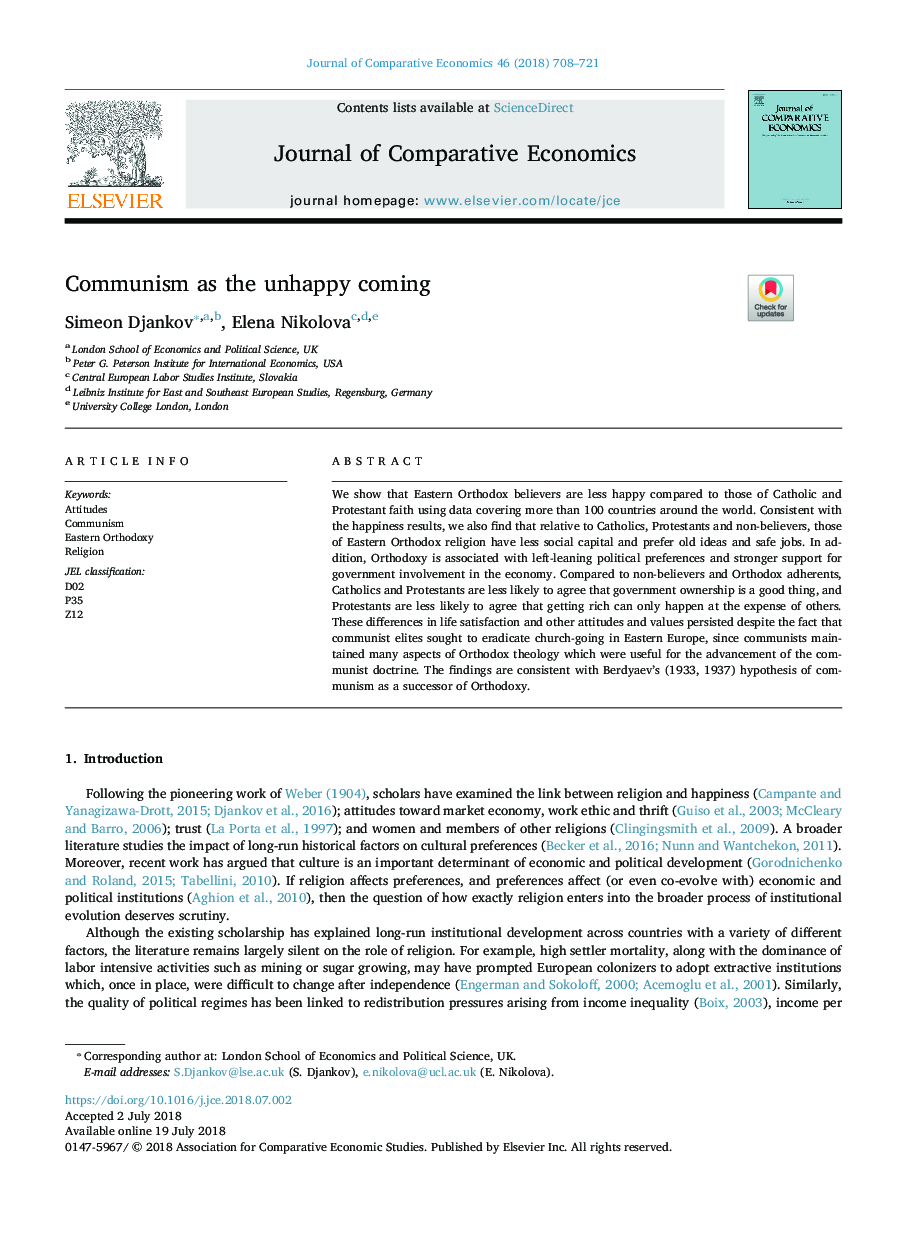| کد مقاله | کد نشریه | سال انتشار | مقاله انگلیسی | نسخه تمام متن |
|---|---|---|---|---|
| 10153662 | 1666220 | 2018 | 14 صفحه PDF | دانلود رایگان |
عنوان انگلیسی مقاله ISI
Communism as the unhappy coming
ترجمه فارسی عنوان
کمونیسم به عنوان آینده ناراضی
دانلود مقاله + سفارش ترجمه
دانلود مقاله ISI انگلیسی
رایگان برای ایرانیان
ترجمه چکیده
ما نشان می دهیم که ایمانداران ارتدوکس شرقی نسبت به ایمان های کاتولیک و پروتستان با استفاده از داده هایی که بیش از 100 کشور را در سراسر جهان پوشش می دهند کمتر خوشحالند. مطابق با نتایج شادی، ما همچنین می بینیم که نسبت به کاتولیک ها، پروتستان ها و غیر مؤمنان، دین هایی که از مذهب ارتدوکس شرقی برخوردار هستند، سرمایه کمتری دارند و ایده های قدیمی و مشاغل امن را ترجیح می دهند. علاوه بر این، ارتدوکس با ترجیحات سیاسی چپ و حمایت قوی از دخالت دولت در اقتصاد همراه است. در مقایسه با غیر مؤمنان و طرفداران ارتدکس، کاتولیک ها و پروتستان ها کمتر به این باور می رسند که مالکیت دولتی یک چیز خوب است و پروتستان ها کمتر معتقدند که ثروتمند شدن تنها به نفع دیگران رخ می دهد. این تفاوت ها در رضایت از زندگی و سایر نگرش ها و ارزش ها همچنان ادامه دارد، به رغم این که نخبگان کمونیست به دنبال ریشه کن کردن کلیسا در اروپای شرقی بودند، زیرا کمونیست ها جنبه های بسیاری از الهیات ارتدکس را حفظ کردند که برای پیشرفت دکترین کمونیست مفید بود. یافته ها با فرضیه بردیاف (1933، 1937) کمونیسم به عنوان جانشین ارتدکسسی مطابقت دارد.
موضوعات مرتبط
علوم انسانی و اجتماعی
اقتصاد، اقتصادسنجی و امور مالی
اقتصاد و اقتصادسنجی
چکیده انگلیسی
We show that Eastern Orthodox believers are less happy compared to those of Catholic and Protestant faith using data covering more than 100 countries around the world. Consistent with the happiness results, we also find that relative to Catholics, Protestants and non-believers, those of Eastern Orthodox religion have less social capital and prefer old ideas and safe jobs. In addition, Orthodoxy is associated with left-leaning political preferences and stronger support for government involvement in the economy. Compared to non-believers and Orthodox adherents, Catholics and Protestants are less likely to agree that government ownership is a good thing, and Protestants are less likely to agree that getting rich can only happen at the expense of others. These differences in life satisfaction and other attitudes and values persisted despite the fact that communist elites sought to eradicate church-going in Eastern Europe, since communists maintained many aspects of Orthodox theology which were useful for the advancement of the communist doctrine. The findings are consistent with Berdyaev's (1933, 1937) hypothesis of communism as a successor of Orthodoxy.
ناشر
Database: Elsevier - ScienceDirect (ساینس دایرکت)
Journal: Journal of Comparative Economics - Volume 46, Issue 3, September 2018, Pages 708-721
Journal: Journal of Comparative Economics - Volume 46, Issue 3, September 2018, Pages 708-721
نویسندگان
Simeon Djankov, Elena Nikolova,
